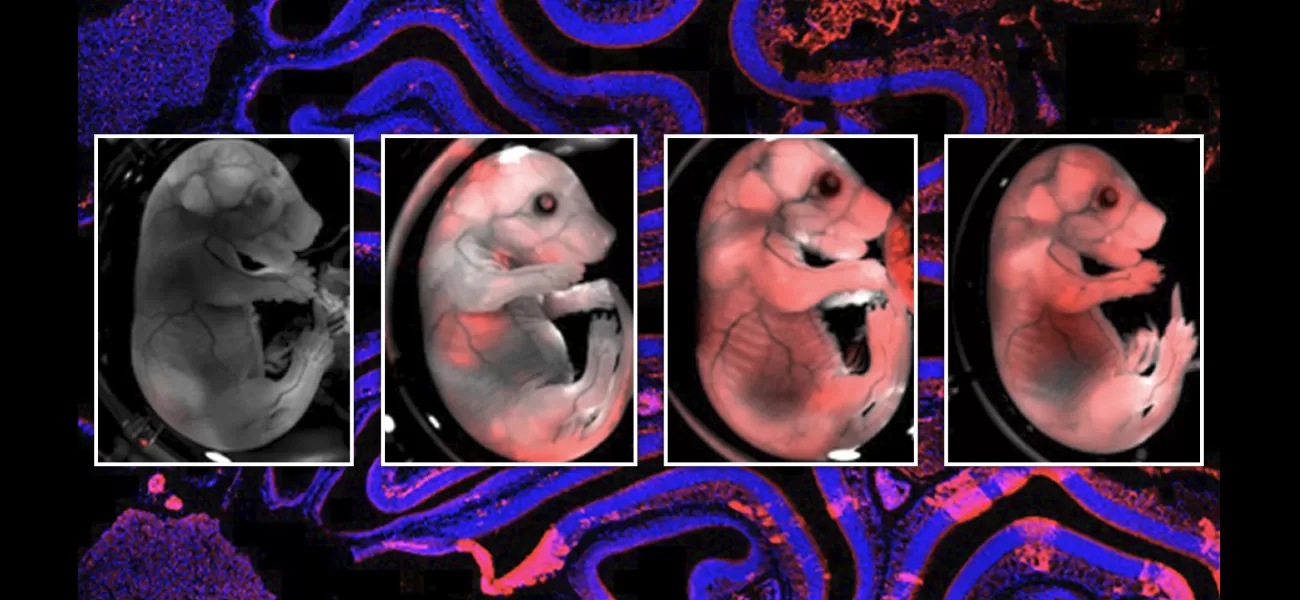Researchers made a hybrid mouse with a rat brain.
Not as frightening as it seems.
May 3rd 2024.

In a groundbreaking discovery, a team of scientists has successfully created a hybrid of a mouse and a rat. You could even say they created a rodent Frankenstein. Two separate studies, conducted by researchers from Columbia University and the University of Texas Southwestern, have revealed the incredible ability of rat brain cells to replace lost neurons in mice.
By combining rat and mouse brains, the team found that the rat cells were able to enhance the mouse's understanding of its environment, and even gave them the ability to sniff out sweets. Lead author of one of the studies, Dr. Kirstin Baldwin, believes that this research will greatly improve our understanding of how mammal brains develop. She explains, "This research is starting to show us how we can expand the flexibility of a brain so that it can accommodate other kinds of inputs, from human-machine interfaces or transplanted stem cells."
Dr. Baldwin's study focused on the formation of networks in a hybrid mouse-rat brain. The team used bacterial toxins to target brain cells involved in developing a sense of smell in developing mouse embryos. These embryos, known as blastocysts, were then injected with stem cells from rats. The hybrid blastocysts were then implanted into mouse mothers, and the team found that the rat cells developed at the same rate as the mouse cells, even though rats typically develop at a slower pace and have larger brains.
To test the success of the experiment, the team removed the mice's sense of smell and placed a cookie in their cage. Some mice were able to find the cookie quicker than others, and the researchers found that the mice whose sense of smell had only been silenced, rather than killed, were less successful.
But how do you tell the difference between a rat and a mouse? While they may look similar, these two rodents are actually entirely different species. They can both be found in similar environments, such as forests, fields, and meadows, but have different life cycles and habitats. Rats tend to live up to 12 months, while mice can live up to 18 months in the wild. Additionally, rats are larger and heavier, with longer, hairier tails. Mice, on the other hand, have larger ears in proportion to their body size.
Dr. Baldwin believes that these findings could potentially lead to new treatments for brain diseases, such as Parkinson's or Alzheimer's, by using donated or lab-grown cells. She explains, "Right now, researchers are transplanting stem cells and neurons into people with Parkinson's and epilepsy. But we do not really understand how well that will work. With hybrid brain models, we can start to get some answers and at a faster pace than a clinical trial."
This groundbreaking technique of growing brain tissues from one species inside another will allow scientists to further explore brain development and evolution. However, before this can be considered as a treatment for human conditions, it would need to go through a primate stage.
The results of these studies, which have been published in the journal Cell, have opened up a new world of possibilities. Dr. Baldwin's study, as well as another similar study led by Dr. Jun Wu from UT Southwestern, focused on replacing an entire brain region with transplanted cells using a gene-editing technique known as CRISPR. Dr. Wu's team found that even though 60% of the cells in the mature mice were of rat origin, the animals behaved like typical lab mice.
This research is truly cutting edge, and has the potential to revolutionize our understanding of brain development and evolution. The possibilities are endless, and with further studies and advancements, we may one day be able to use this technique to help treat human diseases. For now, we can marvel at the incredible abilities of these hybrid creatures and the insights they provide into the complexities of the mammalian brain.
By combining rat and mouse brains, the team found that the rat cells were able to enhance the mouse's understanding of its environment, and even gave them the ability to sniff out sweets. Lead author of one of the studies, Dr. Kirstin Baldwin, believes that this research will greatly improve our understanding of how mammal brains develop. She explains, "This research is starting to show us how we can expand the flexibility of a brain so that it can accommodate other kinds of inputs, from human-machine interfaces or transplanted stem cells."
Dr. Baldwin's study focused on the formation of networks in a hybrid mouse-rat brain. The team used bacterial toxins to target brain cells involved in developing a sense of smell in developing mouse embryos. These embryos, known as blastocysts, were then injected with stem cells from rats. The hybrid blastocysts were then implanted into mouse mothers, and the team found that the rat cells developed at the same rate as the mouse cells, even though rats typically develop at a slower pace and have larger brains.
To test the success of the experiment, the team removed the mice's sense of smell and placed a cookie in their cage. Some mice were able to find the cookie quicker than others, and the researchers found that the mice whose sense of smell had only been silenced, rather than killed, were less successful.
But how do you tell the difference between a rat and a mouse? While they may look similar, these two rodents are actually entirely different species. They can both be found in similar environments, such as forests, fields, and meadows, but have different life cycles and habitats. Rats tend to live up to 12 months, while mice can live up to 18 months in the wild. Additionally, rats are larger and heavier, with longer, hairier tails. Mice, on the other hand, have larger ears in proportion to their body size.
Dr. Baldwin believes that these findings could potentially lead to new treatments for brain diseases, such as Parkinson's or Alzheimer's, by using donated or lab-grown cells. She explains, "Right now, researchers are transplanting stem cells and neurons into people with Parkinson's and epilepsy. But we do not really understand how well that will work. With hybrid brain models, we can start to get some answers and at a faster pace than a clinical trial."
This groundbreaking technique of growing brain tissues from one species inside another will allow scientists to further explore brain development and evolution. However, before this can be considered as a treatment for human conditions, it would need to go through a primate stage.
The results of these studies, which have been published in the journal Cell, have opened up a new world of possibilities. Dr. Baldwin's study, as well as another similar study led by Dr. Jun Wu from UT Southwestern, focused on replacing an entire brain region with transplanted cells using a gene-editing technique known as CRISPR. Dr. Wu's team found that even though 60% of the cells in the mature mice were of rat origin, the animals behaved like typical lab mice.
This research is truly cutting edge, and has the potential to revolutionize our understanding of brain development and evolution. The possibilities are endless, and with further studies and advancements, we may one day be able to use this technique to help treat human diseases. For now, we can marvel at the incredible abilities of these hybrid creatures and the insights they provide into the complexities of the mammalian brain.
[This article has been trending online recently and has been generated with AI. Your feed is customized.]
[Generative AI is experimental.]
0
0
Submit Comment





